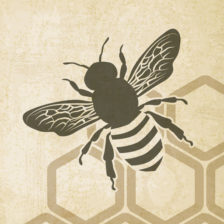Human democracy appears to be in trouble. That’s the message of the October 2018 issue of The Atlantic magazine. Careful readers will notice that the Atlantic’s treatment of this subject is somewhat different than noted here. The word “human” is missing. This “anthropocentric” concept is worth examining further.
The Rights of Nature by Jeremy Barnes, as noted in my most recent newsletter, begins, “The most unusual aspect of being human is that we live simultaneously inside and outside of nature. We are subject to the same laws as other animals – our life span is finite, we vie for mates, we respond to variations of temperature and climate – yet unlike other species we consider ourselves not only separate from, but superior to, and more important than, the rest of life.
“And just as every organism has a defining characteristic so does it have a habitat, a niche with food, water and shelter. We, by contrast, not only thrive in different habitats but can invent our own, whether it is the complexity of a city or the recent bio-dome built to test humans’ ability to survive in a Martian environment. If we accept civilization as beginning 10 000 years ago with the development of permanent human settlements in at least four different areas of the world, then our society was essentially agricultural for 97% of that time, before the scientific revolution drastically re-shaped our living standards and our environment.”
When compared to many of the organisms inhabiting this earth, humans are a pretty young species and this shows in much of what Mr. Barnes describes above. However, as he observes we humans appear to have something most other species lack, the ability to shift both our thinking and acting when faced with an uncertain, changing environment.
He continues: “Our challenge is to move consciously from the current Industrial era to an Ecological era. Using comparisons developed by Riane Eisler and David Loye in The Chalice and the Blade, what if we were to move from an emphasis on material progress to one of a balance between materialism and spirituality; from a consumptive, self-serving behavior to a more cooperative, life-serving behavior; to an identity defined by possessions and social status which leaves us feeling separate and alone, to an identity defined by our participation in life which leaves us feeling connected to a larger universe?
Much of the above seems within our grasp, but missing is the role of governance in the human species, at risk perhaps due to our precipitous rise as the world’s most dominating species, culminating in what is being called the anthropocene. This state of affairs resulted in the 1992 World Scientists’ Warning to Humanity signed by 1,700 scientists and followed up with a second notice in November 2017, with 15,364 signatories, more scientist cosigners and formal supporters than any other journal article ever published.[3] A key phrase in the warning is the following: “But we herewith demand that this stock-taking, monitoring and preservation be founded on scientific criteria and not on irrational pre-conceptions.”
Unfortunately, humans it seems are far more likely to subscribe to authoritarian voices, which drown out many others and are uniquely susceptible to conspiracy theories, all of which mitigate against the quote above. In essence this is the basic argument in The Atlantic’s suite of articles. A series of themes pertains strictly to human democracy, under immense pressure to deliver what populists now promise. The bottom line is that humans in many democracies are simply not educated in governance, nor involved enough and/or not willing to work to adequately respond to what is currently being offered by authoritarian forces.
As Mr. Barnes concludes: “Recent elections in Europe and the USA suggest a retrogression to divisiveness, confrontation, fear, judgement and the elements of domination associated with control and subjugation. Nurturing, by contrast, challenges us to view the world as a living organism of which we are a part rather than an object to be conquered and exploited.”
In short, our interactions should be based on a wining strategy of cooperation rather than a political calculus primarily based on money. Given, this reasoning, readers are urged to see the film “Active Measures,” a timely response to our current political situation.
In his ground-breaking book, Honeybee Democracy, Professor Tom Seeley has looked in depth at how honeybee society makes decisions and has found the situation remarkably similar what humans face. Within the context of New England town meetings he comes up with the following “lessons”:
1. Compose the Decision-Making Group of Individuals with Shared Interests and Mutual Respect.
2. Minimize the Leader’s Influence on the Group’s Thinking
3. Seek Diverse Solutions to the Problem
4. Aggregate the Group’s Knowledge Through Debate
Most impressive about the bees’ social choices is the ability to distinguish good options from bad. This arises from an ingenious balance between interdependence and independence. In humans this can be fostered by open and fair debate to integrate information, encouraging good communication among the group, and ensuring that group members listen critically, yet form their own opinions and register views independently.
The above principles are featured in an alternative governance model, which might be something humans should further explore. This is called sociocracy, often labelled “dynamic governance.” I explore Dr. Seeley’s four “lessons” in some detail and thank Kirsten Traynor at American Bee Journal for publishing my article in the September 2018 issue entitled: “Is Honeybee Democracy Really Sociocracy?” Your comments are solicited.

